Other reading
Some books socialists like
During the Covid pandemic in 2020-21, normal meetings were replaced by online discussions, and one of these was about favourite books we thought might appeal to other socialists and people interested in socialist ideas. It was a pretty good discussion which you can hear here so we thought we’d also put up a list of some of the books discussed, with comments by various members. Obviously it’s not comprehensive and there are notable absences, especially in the region of SF (Banks, Robinson, etc – see the note at the end) so if you’ve got a recommendation, why not send details and a paragraph of suitable blurb to spgb@worldsocialism.org and we’ll post it up.
There are one or two non-fiction titles cited here. Comments are by various contributors.
News From Nowhere, William Morris (1890)
 Edward Bellamy had written a ‘socialist’ utopian novel (Looking Backward) the year before which was very popular but which Morris hated, because it involved money and monolithic state-capitalist employment, so Morris had a go himself. The result was a rather Thomas Hardy take on socialism, steeped in bucolic nostalgia, and of course leaden with tell-not-show exposition, but despite everything this is still the number one socialist classic. Bin men dress like emperors for fun, energy comes from mysterious and unexplained sources, Manchester is wiped off the map, the Houses of Parliament are used to store pig-shit, and the women are all still stuck in the kitchen, showing that even Morris was a man of his time (though he did protest that he had consulted his female acquaintances on the matter).
Edward Bellamy had written a ‘socialist’ utopian novel (Looking Backward) the year before which was very popular but which Morris hated, because it involved money and monolithic state-capitalist employment, so Morris had a go himself. The result was a rather Thomas Hardy take on socialism, steeped in bucolic nostalgia, and of course leaden with tell-not-show exposition, but despite everything this is still the number one socialist classic. Bin men dress like emperors for fun, energy comes from mysterious and unexplained sources, Manchester is wiped off the map, the Houses of Parliament are used to store pig-shit, and the women are all still stuck in the kitchen, showing that even Morris was a man of his time (though he did protest that he had consulted his female acquaintances on the matter).
You can read it here for free.
Ragged-Trousered Philanthropists, Robert Noonan (1914)
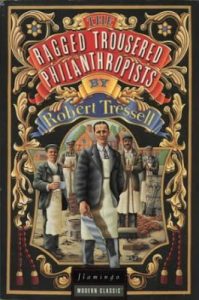 An unforgettable book written by a jobbing housepainter and expressing some terrific socialist sentiments, until the big quasi-Labour Party reformist speech that makes no political or contextual sense. Noonan died before it was published, and the original manuscript was heavily altered by its first editor, with several chapters being removed and others switched round to give it a tragic and negative end. This may have been at the behest of the publisher, however it’s also possible that the alterations were politically motivated. Jessie Pope, the editor, was certainly no socialist sympathiser and later became famous as a prominent White Feather activist during WW1 and the author of numerous jingoistic pro-war poems (a disgusted Wilfred Owen dedicated his famous poem Dulce et Decorum Est to her). A new edition was produced in 1955 but it may be that original material was lost. In any event, this is a classic of pre-war working-class life, with a cast of brilliantly drawn characters, and famous above all for its presentation of ‘the money trick’.
An unforgettable book written by a jobbing housepainter and expressing some terrific socialist sentiments, until the big quasi-Labour Party reformist speech that makes no political or contextual sense. Noonan died before it was published, and the original manuscript was heavily altered by its first editor, with several chapters being removed and others switched round to give it a tragic and negative end. This may have been at the behest of the publisher, however it’s also possible that the alterations were politically motivated. Jessie Pope, the editor, was certainly no socialist sympathiser and later became famous as a prominent White Feather activist during WW1 and the author of numerous jingoistic pro-war poems (a disgusted Wilfred Owen dedicated his famous poem Dulce et Decorum Est to her). A new edition was produced in 1955 but it may be that original material was lost. In any event, this is a classic of pre-war working-class life, with a cast of brilliantly drawn characters, and famous above all for its presentation of ‘the money trick’.
The Dispossessed, Ursula K Le Guin (1974)
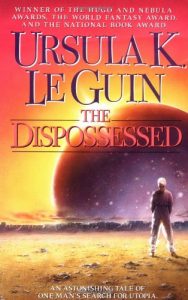 Capitalism on a planet, anarchism on its moon, the perfect setup for comparison purposes which Ursula Le Guin exploits ingeniously. The analysis of capitalist culture is insightful, but the anarchism is a bit hairshirt and shoestring, implying (wrongly) that democratic common ownership might be low-tech, hard graft and barely self-sustaining. Still, the community and freedom of thought the anarchists enjoy seems to make up for the lack of humour and Mediterranean salad vegetables.
Capitalism on a planet, anarchism on its moon, the perfect setup for comparison purposes which Ursula Le Guin exploits ingeniously. The analysis of capitalist culture is insightful, but the anarchism is a bit hairshirt and shoestring, implying (wrongly) that democratic common ownership might be low-tech, hard graft and barely self-sustaining. Still, the community and freedom of thought the anarchists enjoy seems to make up for the lack of humour and Mediterranean salad vegetables.
Woman on the Edge of Time, Marge Piercy (1976)
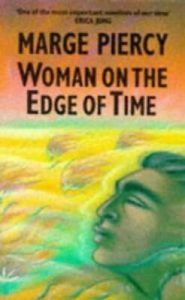 A different take on anarcho-socialism, under siege this time, and with protagonists who’ve tried to solve gender politics by merging into one gender. Some terrific ideas and insights, some far-fetched and some that even Piercy later decided were beyond the pale. It’s also a study of how capitalism deals with the mentally ill, which provides the author with a handy get-out clause – is the protagonist really being visited by an anarchist from the future, or is it all in her mind?
A different take on anarcho-socialism, under siege this time, and with protagonists who’ve tried to solve gender politics by merging into one gender. Some terrific ideas and insights, some far-fetched and some that even Piercy later decided were beyond the pale. It’s also a study of how capitalism deals with the mentally ill, which provides the author with a handy get-out clause – is the protagonist really being visited by an anarchist from the future, or is it all in her mind?
Salt, Adam Roberts (2000)
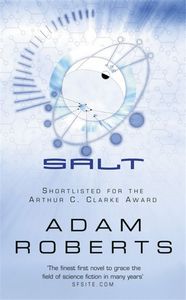 Two contrasting communities are among those that settle on a distant planet where the land surface consists primarily of salt. Senaar is religious and authoritarian, while Als is anarchist, has no money and does not even use possessive forms such as ‘my’. The misunderstandings and conflicts between them gradually increase. There are some interesting sidelights on the contrasting attitudes of the two, but not much detail on how the anarchist one functions.
Two contrasting communities are among those that settle on a distant planet where the land surface consists primarily of salt. Senaar is religious and authoritarian, while Als is anarchist, has no money and does not even use possessive forms such as ‘my’. The misunderstandings and conflicts between them gradually increase. There are some interesting sidelights on the contrasting attitudes of the two, but not much detail on how the anarchist one functions.
The Stone Canal, Ken MacLeod {1996)
 A novel that features androids, gynoids, clones of humans, and different sociopolitical systems. One of the main characters is the son of two Socialist Party members but becomes an anarchist; he says of his father, ‘He thought he was turning a space-age schoolkid into a scientific socialist, but all he was doing was raising me to be as stubborn an outsider as himself.’ Good luck with following all the plot developments. Reviewed here.
A novel that features androids, gynoids, clones of humans, and different sociopolitical systems. One of the main characters is the son of two Socialist Party members but becomes an anarchist; he says of his father, ‘He thought he was turning a space-age schoolkid into a scientific socialist, but all he was doing was raising me to be as stubborn an outsider as himself.’ Good luck with following all the plot developments. Reviewed here.
The Communist Manifesto, Karl Marx (1848)
 An easy quick read and then you can say you’ve read some Marx. Full of ringing rhetoric and rousing phrases, and proof that Marx could be a dazzling polemicist when he wanted to. Just don’t take the arguments too literally, as Marx and Engels later changed their minds about a lot of it when the 1848 ‘revolutions’ had fizzled out and capitalism seemed set for the longer term.
An easy quick read and then you can say you’ve read some Marx. Full of ringing rhetoric and rousing phrases, and proof that Marx could be a dazzling polemicist when he wanted to. Just don’t take the arguments too literally, as Marx and Engels later changed their minds about a lot of it when the 1848 ‘revolutions’ had fizzled out and capitalism seemed set for the longer term.
The Peter Principle, Laurence J Peter & Raymond Hull (1969)
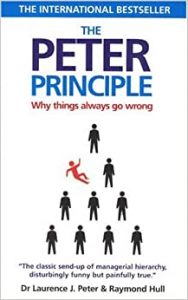 Hull provided the jokey writing but Laurence J Peter’s ingenious business ‘law’ provides the real comedy: that each employee tends to rise to their unique level of incompetence, ie. that capable people keep getting promoted until they overshoot their abilities and then languish in a job they can’t really do. The consequence of this is that hierarchies tend to be staffed and headed by people who aren’t up to the job. For evidence of the Peter Principle in action, witness the current UK government, or indeed any government. Most workers’ experiences of employer organisations tend to bear out this principle too. Peter wasn’t putting the socialist case of course, but it’s not hard to see how the Peter Principle relates to anarchist-socialist views on the intrinsic flaws of leadership and power structures. This is the book that coined the term ‘jobsworth’, and is the perfect antidote for anyone silly enough to believe that leaders know what they’re doing and have everything under control. In truth it’s almost miraculous that capitalism achieves anything at all.
Hull provided the jokey writing but Laurence J Peter’s ingenious business ‘law’ provides the real comedy: that each employee tends to rise to their unique level of incompetence, ie. that capable people keep getting promoted until they overshoot their abilities and then languish in a job they can’t really do. The consequence of this is that hierarchies tend to be staffed and headed by people who aren’t up to the job. For evidence of the Peter Principle in action, witness the current UK government, or indeed any government. Most workers’ experiences of employer organisations tend to bear out this principle too. Peter wasn’t putting the socialist case of course, but it’s not hard to see how the Peter Principle relates to anarchist-socialist views on the intrinsic flaws of leadership and power structures. This is the book that coined the term ‘jobsworth’, and is the perfect antidote for anyone silly enough to believe that leaders know what they’re doing and have everything under control. In truth it’s almost miraculous that capitalism achieves anything at all.
Yes Minister, BBC (1980 – 88)
 The complete scripts. As above, really, this should be required reading or watching for anyone who believes what any government says about anything.
The complete scripts. As above, really, this should be required reading or watching for anyone who believes what any government says about anything.
Zen and the Art of Motorcycle Maintenance, Robert Pirsig (1974)
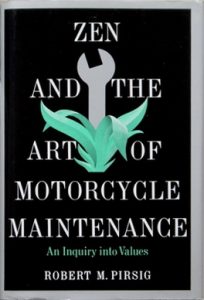 One of those formative, hippy books that people probably don’t read anymore, it warns you not to live by simplistic Aristotelian binary logic and explores the much more textured subtleties of the sophists through explorations of concepts like ‘quality’ and ‘virtue’. It doesn’t teach you anything about how to fix motorbikes, but it does suggest you find the ‘gumption’ to at least lift the engine cover and have a look for yourself, because you never know, the solution might be obvious. If not, buy a Haynes manual. Useful for socialists? Well, we could all do with the gumption to lift the lid on society and look for things that are obviously wrong with it.
One of those formative, hippy books that people probably don’t read anymore, it warns you not to live by simplistic Aristotelian binary logic and explores the much more textured subtleties of the sophists through explorations of concepts like ‘quality’ and ‘virtue’. It doesn’t teach you anything about how to fix motorbikes, but it does suggest you find the ‘gumption’ to at least lift the engine cover and have a look for yourself, because you never know, the solution might be obvious. If not, buy a Haynes manual. Useful for socialists? Well, we could all do with the gumption to lift the lid on society and look for things that are obviously wrong with it.
Cosmos, Carl Sagan (1980)
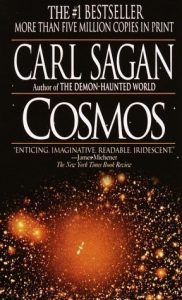 Sagan was an outstanding and iconic physicist who was revered among scientists and lay-audiences alike for his ability to convey the wonder of scientific discovery with warm humanity and superb writing. This book is the story of the development of modern science from its earliest beginnings among the ancient Greeks, showing how far we’ve come, but also in a socialistic sense, how far we have yet to go as a species. If you don’t like or know much about science or the scientific method, or you think of scientists as boring boffins in lab coats, you may very well find this a life-changing book.
Sagan was an outstanding and iconic physicist who was revered among scientists and lay-audiences alike for his ability to convey the wonder of scientific discovery with warm humanity and superb writing. This book is the story of the development of modern science from its earliest beginnings among the ancient Greeks, showing how far we’ve come, but also in a socialistic sense, how far we have yet to go as a species. If you don’t like or know much about science or the scientific method, or you think of scientists as boring boffins in lab coats, you may very well find this a life-changing book.
Things, Georges Perec (1965)
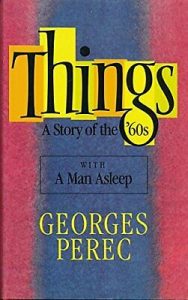 When I read this years ago, I was struck by its description of the desolate way of life in modern capitalism – “a world which promised so much and delivered nothing” to quote the English translation. If you can stand Perec’s experimental writing style, you should enjoy it! Free English translation here.
When I read this years ago, I was struck by its description of the desolate way of life in modern capitalism – “a world which promised so much and delivered nothing” to quote the English translation. If you can stand Perec’s experimental writing style, you should enjoy it! Free English translation here.
Capital Vol 1 (1867)
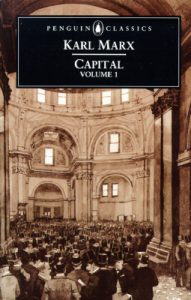 – the ‘non-economic’ bits. When I recommended this, I was thinking of how current the issues described in e.g, chapters X and XV are. Marx describes unhealthy working conditions and owners evading legislation in the mid-19th century – reminiscent of the revelations about sweatshops in Leicester (UK) in the summer of 2020. He describes how technological development from one aspect is detrimental to workers – sometimes throwing them out of work or, by simplifying processes, reducing wages. It shows how modern ‘disruptive’ tech (IT, AI) are not so new at all, at least as far as their negative effect on workers is concerned. And lastly, read the final Section VIII – The so-called Primitive Accumulation – to understand how the working class came into existence in Britain. Free download available at the Marxist Archive.
– the ‘non-economic’ bits. When I recommended this, I was thinking of how current the issues described in e.g, chapters X and XV are. Marx describes unhealthy working conditions and owners evading legislation in the mid-19th century – reminiscent of the revelations about sweatshops in Leicester (UK) in the summer of 2020. He describes how technological development from one aspect is detrimental to workers – sometimes throwing them out of work or, by simplifying processes, reducing wages. It shows how modern ‘disruptive’ tech (IT, AI) are not so new at all, at least as far as their negative effect on workers is concerned. And lastly, read the final Section VIII – The so-called Primitive Accumulation – to understand how the working class came into existence in Britain. Free download available at the Marxist Archive.
Capital, John Lanchester (Faber & Faber, 2013)
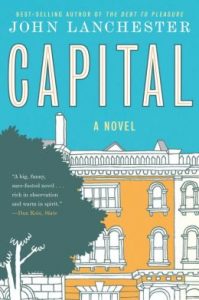 This isn’t a new edition of Marx but a novel set in an up-and-coming street of North London chronicling the effect of capitalism’s 2008 downturn on a range of wage slaves, from the highly to the lowly paid. An acute examination of what capitalism does to human psychology, while at the same time incredibly readable and constantly making you smile out loud. There’s a Guardian review here.
This isn’t a new edition of Marx but a novel set in an up-and-coming street of North London chronicling the effect of capitalism’s 2008 downturn on a range of wage slaves, from the highly to the lowly paid. An acute examination of what capitalism does to human psychology, while at the same time incredibly readable and constantly making you smile out loud. There’s a Guardian review here.
Notes from the End of History: A Memoir of the Left in Wales, Philip Bounds (Merlin Press, 2012)
 This is a brilliantly written post-Second World War memoir of people and organisations on the Welsh left-wing political scene with scenes and encounters that come alive on the page and bring to vivid life the characters in them. It also contains a beautifully observed chapter about the SPGB (entitled ‘In the House of Marx’) which the writer first came in to contact with in his teenage years, even though he later spent many years in the Communist Party. Reviewed in the Socialist Standard here and the author has a Wikipedia entry here.
This is a brilliantly written post-Second World War memoir of people and organisations on the Welsh left-wing political scene with scenes and encounters that come alive on the page and bring to vivid life the characters in them. It also contains a beautifully observed chapter about the SPGB (entitled ‘In the House of Marx’) which the writer first came in to contact with in his teenage years, even though he later spent many years in the Communist Party. Reviewed in the Socialist Standard here and the author has a Wikipedia entry here.
Team Human, Douglas Rushkoff, (Norton, 2019)
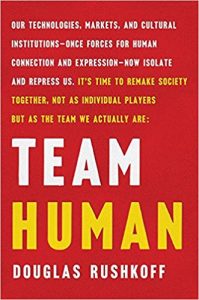 This book calls upon wide ranging research on human evolution, anthropology and psychology to argue that human beings are essentially social creatures and that we achieve our aspirations best when we work collectively – not as competing individuals (‘When we work together, we realise greater happiness, productivity and peace’). Even if it doesn’t go as far as advocating socialism in our terms as a way of doing this, it presents a searing critique of capitalism for the way it encourages non-cooperative self-interested behaviour bringing out the worst in people rather than the best. See the Team Human website and book blurb.
This book calls upon wide ranging research on human evolution, anthropology and psychology to argue that human beings are essentially social creatures and that we achieve our aspirations best when we work collectively – not as competing individuals (‘When we work together, we realise greater happiness, productivity and peace’). Even if it doesn’t go as far as advocating socialism in our terms as a way of doing this, it presents a searing critique of capitalism for the way it encourages non-cooperative self-interested behaviour bringing out the worst in people rather than the best. See the Team Human website and book blurb.
Rosa Luxemburg, Dana Mills (Reaktion, 2020)
 A biography that looks at her political and economic ideas. A good book that gets to grips with Rosa’s life and passions. Interview with Dana Mills here.
A biography that looks at her political and economic ideas. A good book that gets to grips with Rosa’s life and passions. Interview with Dana Mills here.
Eleanor Marx: A Life, Rachel Holmes (Bloomsbury, 2014)
 Rachel Holmes restores Eleanor to her place as a revolutionary in her own right, and tells the story of her life and passions. The book is very readable, like the Marx biography by Francis Wheen.
Rachel Holmes restores Eleanor to her place as a revolutionary in her own right, and tells the story of her life and passions. The book is very readable, like the Marx biography by Francis Wheen.
Martov – a biography, Israel Getzler (1967)
 A good book that looks at Martov’s life and politics and his disagreement with Lenin. Martov took an internationalist stance against the war. There is an alleged quote from Lenin on his death bed that Martov had been right to oppose the taking of power when socialism was not possible. Available to borrow from openlibrary.org here.
A good book that looks at Martov’s life and politics and his disagreement with Lenin. Martov took an internationalist stance against the war. There is an alleged quote from Lenin on his death bed that Martov had been right to oppose the taking of power when socialism was not possible. Available to borrow from openlibrary.org here.
Down and out in Paris and London, George Orwell (1933)
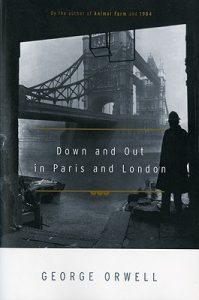 Looks at poverty in two capital cities, where Orwell claimed to have lived as a tramp or on the edge of destitution. A degree of artistic licence may have been involved there, however it’s a powerful exposé of life at the bottom of the heap as experienced by many workers at the time.
Looks at poverty in two capital cities, where Orwell claimed to have lived as a tramp or on the edge of destitution. A degree of artistic licence may have been involved there, however it’s a powerful exposé of life at the bottom of the heap as experienced by many workers at the time.
The road to Wigan Pier, George Orwell (1937)
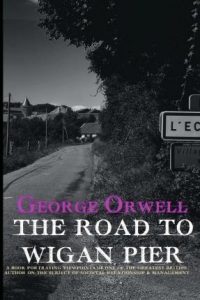 Looks at the conditions of poverty in England. He concludes ‘There is no chance of righting the conditions I described in the earlier chapters of this book, or of saving England from Fascism, unless we can bring an effective Socialist party into existence. It will have to be a party with genuinely revolutionary intentions, and it will have to be numerically strong enough to act.”
Looks at the conditions of poverty in England. He concludes ‘There is no chance of righting the conditions I described in the earlier chapters of this book, or of saving England from Fascism, unless we can bring an effective Socialist party into existence. It will have to be a party with genuinely revolutionary intentions, and it will have to be numerically strong enough to act.”
Birdsong, Sebastian Faulks (Vintage, 1994)
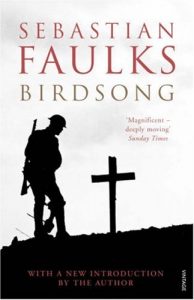 Not really a socialist book, it describes graphically the conditions in the First World War. Soldiers dig tunnels to blow the enemy up. Some chapters are quite harrowing, but it is a good read.
Not really a socialist book, it describes graphically the conditions in the First World War. Soldiers dig tunnels to blow the enemy up. Some chapters are quite harrowing, but it is a good read.
New Grub Street, George Gissing (Oxford, 2016)
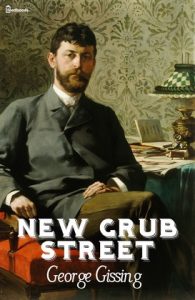 Written in 1891 but entirely contemporary in its message, this novel tells the story of two aspiring young writers with different takes on ‘making it’. One of them, the less talented, is happy to adopt all manner of underhand tactics including ‘using’ those close to him, while the other is far more scrupulous and caring in his ways of doing things. This book recounts unflinchingly the rise to fame of the one and the descent into despair and destitution of the other. In so doing it illustrates compellingly how little a system focused on money and ‘success’ encourages and rewards creativity and integrity.
Written in 1891 but entirely contemporary in its message, this novel tells the story of two aspiring young writers with different takes on ‘making it’. One of them, the less talented, is happy to adopt all manner of underhand tactics including ‘using’ those close to him, while the other is far more scrupulous and caring in his ways of doing things. This book recounts unflinchingly the rise to fame of the one and the descent into despair and destitution of the other. In so doing it illustrates compellingly how little a system focused on money and ‘success’ encourages and rewards creativity and integrity.
The Monument, Robert Barltrop (Pluto Press, 1976)
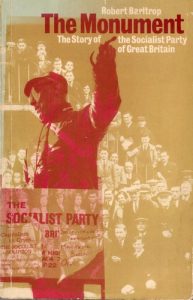 The history of the SPGB from its early years meeting in temperance tea rooms up to the time of writing, full of larger-than-life characters and fascinating (and possibly apocryphal) anecdotes which makes some members a bit sniffy about its claim to authenticity. But it’s a rattling good read all the same. Hard to get as it’s out of print and we can’t get the rights to reprint it, but if you ask around one of our members might have a copy you can borrow.
The history of the SPGB from its early years meeting in temperance tea rooms up to the time of writing, full of larger-than-life characters and fascinating (and possibly apocryphal) anecdotes which makes some members a bit sniffy about its claim to authenticity. But it’s a rattling good read all the same. Hard to get as it’s out of print and we can’t get the rights to reprint it, but if you ask around one of our members might have a copy you can borrow.
The Frock-Coated Communist – The revolutionary life of Friedrich Engels, Tristram Hunt (Penguin, 2009)
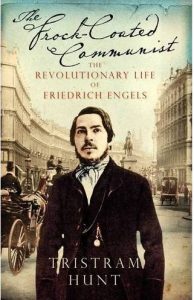 This is an excellent biography of Friedrich Engels. If his life is less well known than that of Marx, Engels would not complain – over and over, from his first meeting with Marx in 1844, he stressed with genuine modesty that Marx was the genius to whom he played second fiddle. His admiration of Marx, his staunch friendship, his financial generosity to him and his family (even including those of them who were shameless spongers) are all selfless. Hunt makes it clear, though, how enormously important his intellectual contributions to Marxism were, how tirelessly he did research for Marx, how they discussed their ideas with each other almost daily – by letter when Engels was living in Manchester and Marx in London, and by daily visits when Engels moved to London himself, a short distance away from Marx’s home.
This is an excellent biography of Friedrich Engels. If his life is less well known than that of Marx, Engels would not complain – over and over, from his first meeting with Marx in 1844, he stressed with genuine modesty that Marx was the genius to whom he played second fiddle. His admiration of Marx, his staunch friendship, his financial generosity to him and his family (even including those of them who were shameless spongers) are all selfless. Hunt makes it clear, though, how enormously important his intellectual contributions to Marxism were, how tirelessly he did research for Marx, how they discussed their ideas with each other almost daily – by letter when Engels was living in Manchester and Marx in London, and by daily visits when Engels moved to London himself, a short distance away from Marx’s home.
The book sets the ideas of Marx and Engels very fully into the historical context and into that of other kinds of socialism that Engels certainly shared Marx’s combativeness towards the exponents of rival theories.
Karl Marx – Francis Wheen (1999)
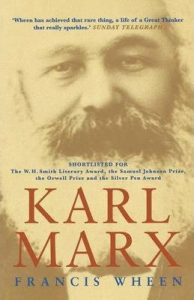 Karl Marx spent most of his lifetime in obscurity. Penniless, exiled in London, estranged from relations and on the run from most of the police forces of Europe, his ambitions as a revolutionary were frequently thwarted and his major writings on politics and economics remained unpublished (in some cases until after the Second World War). He has not lacked biographers, but even the most distinguished have been more interested in the evolution of his ideas than any other aspect of his life. Francis Wheen’s fresh, lively and moving biography of Marx considers the whole man–brain, beard and the rest of his body. Unencumbered by ideological point-scoring, this is a very readable, humorous and sympathetic account. Wheen has an ear for juicy gossip and an eye for original detail. Marx comes over as a hell-raising bohemian, an intellectual bully and a perceptive critic of capitalist chaos, but also a family man of Victorian conformity personally vetting his daughters’ suitors, Victorian ailments (carbuncles above all) and Victorian weaknesses, notably alcohol, tobacco and, on occasion, his housekeeper. But there is great pathos, too, as Marx witnessed the deaths of four of his six children. For those readers who feel Marxism has given Marx a bad name, this is a rewarding and enlightening book.
Karl Marx spent most of his lifetime in obscurity. Penniless, exiled in London, estranged from relations and on the run from most of the police forces of Europe, his ambitions as a revolutionary were frequently thwarted and his major writings on politics and economics remained unpublished (in some cases until after the Second World War). He has not lacked biographers, but even the most distinguished have been more interested in the evolution of his ideas than any other aspect of his life. Francis Wheen’s fresh, lively and moving biography of Marx considers the whole man–brain, beard and the rest of his body. Unencumbered by ideological point-scoring, this is a very readable, humorous and sympathetic account. Wheen has an ear for juicy gossip and an eye for original detail. Marx comes over as a hell-raising bohemian, an intellectual bully and a perceptive critic of capitalist chaos, but also a family man of Victorian conformity personally vetting his daughters’ suitors, Victorian ailments (carbuncles above all) and Victorian weaknesses, notably alcohol, tobacco and, on occasion, his housekeeper. But there is great pathos, too, as Marx witnessed the deaths of four of his six children. For those readers who feel Marxism has given Marx a bad name, this is a rewarding and enlightening book.
A Socialist Life – Heather Ball
Articles from the Socialist Standard between 1995 and 2000 (plus some unpublished).
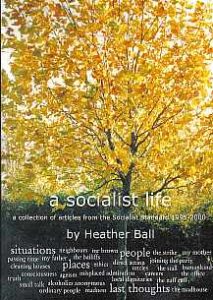 “There is an erosion of everything socialism requires and capitalism despises – co-operation, self-respect, love even. I hesitate to use the word ‘love’ when talking about human relationships’ – the suspicious sidelong glances I get sometimes make me wonder if it is thought I am advocating multiple orgasms for everyone. Love to me represents the possibility of having such good feelings about ourselves that we can afford to have them about other people too. Yet in this miserable society where money and exploitation must come first, we are discouraged from showing too much concern for one another in case this detracts from our real purpose – to provide profit and power for a minority”.
“There is an erosion of everything socialism requires and capitalism despises – co-operation, self-respect, love even. I hesitate to use the word ‘love’ when talking about human relationships’ – the suspicious sidelong glances I get sometimes make me wonder if it is thought I am advocating multiple orgasms for everyone. Love to me represents the possibility of having such good feelings about ourselves that we can afford to have them about other people too. Yet in this miserable society where money and exploitation must come first, we are discouraged from showing too much concern for one another in case this detracts from our real purpose – to provide profit and power for a minority”.
An absolute must read for anyone flirting with the ideas of The Socialist Party. Or for anyone, including long standing members who have not had the pleasure of reading it yet.
By the way, there’s a decent list of SF novels at the end of this Wikipedia article.
